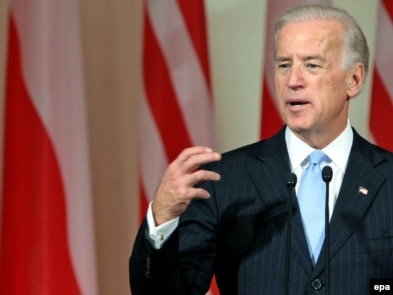Poland Ready To Participate In
 U.S. Vice President Joe Biden talks to the press in Warsaw.
U.S. Vice President Joe Biden talks to the press in Warsaw.Tusk made his comments after meeting U.S. Vice President Joe Biden, who is in Warsaw as he kicks off a tour of Eastern European capitals, part of an effort to reassure allies in the region that Washington’s “reset” in relations with Russia won’t come at their expense.
“Poland sees this concept, this project, this new configuration of missile defense, as very interesting and necessary. And we are ready to take part in it to the extent that is needed,” Tusk said at a joint press conference with Biden.
Officials in many former communist Eastern European countries are concerned their security interests will be sacrificed as U.S. President Barack Obama seeks to improve relations with Russia, which sank to a post-Cold War low under the George W. Bush administration.
Polish and Czech officials are especially nervous about Obama’s decision in September to reconfigure U.S. missile-defense plans in Europe.
Obama scrapped a Bush administration plan to place interceptor missiles in Poland and an advanced radar in the Czech Republic in favor of a more mobile system that will initially rely on sea-based interceptors. Moscow fiercely opposed the earlier plan.
U.S. officials say the new plan is designed to counter a current threat from short- and intermediate-range Iranian missiles. The White House and Pentagon say Obama’s proposal is superior to the Bush plan, which was designed to defend against a long-range missile threat from Iran that does not yet exist.
“Simply put, our missile plan is better security for NATO and is better security for Poland,” Biden said.
Obama’s missile shield plan would initially deploy sea-based SM-3 interceptor missiles in 2011. An updated version would later be positioned at sea and land — possibly in Poland and the Czech Republic — in 2015.
The White House says a more advanced system would be built in 2018 and 2020, with the capability to intercept long-range Iranian missiles, should that need arise.
No ‘Reset’ For U.S. Allies
But for many Eastern Europeans, the missile-defense plan was less about Iran and more about their own fears of Moscow.
Czech and Polish officials in particular believed hosting components of a missile-defense system provided symbolic security against a threat from Russia, and saw Obama’s move as a dangerous capitulation to Moscow.
Frantisek Sulc, a reporter for the Czech weekly “Tyden” and the co-author of a book on missile defense, says despite being NATO members and beneficiaries of the alliance’s Article 5 collective security guarantee, many Poles and Czechs still fear Moscow.
“It is psychological. The Poles and the Czechs want to have bigger assurances because of the past — because of the history with the Soviet Union, because of the invasions, because of the sphere of influence. There is still a fear of Russia,” Sulc says.
Sulc says that those in favor of deploying the radar in the Czech Republic country “usually mentioned that if the United States troops would be stationed here then we would be more secure. The physical presence, for a portion of the population of the Czech Republic, is really important.”
In an interview before his trip with the Polish daily “Rzeczpospolita,” Biden said the United States would not sign any agreements with Moscow that harm the security of its allies in Central and Eastern Europe. The United States will decide “nothing about you without you,” Biden said.
Biden also defended the Russia reset in general, saying, “improving the mood between the United States and Russia will contribute to improving security in Europe and will bring benefits to our allies.”
Biden is expected to propose that Poland host SM-3 interceptors to target short- and intermediate-range Iranian missiles. Obama’s plan calls for initially deploying sea-based interceptors before later adding the land-based SM-3 missiles.
Warsaw also wants Washington to deploy a Patriot interceptor missile battery to Poland to help upgrade the country’s air defenses. Under the Bush plan, Warsaw had secured a commitment for the temporary deployment of Patriot missiles several times a year.
Biden’s trip marks the second time in recent months the White House has dispatched the vice president to calm jittery U.S. allies over Washington’s policy of improving ties with Moscow. Biden visited Georgia and Ukraine in July.


Leave a Reply